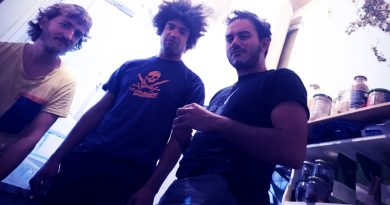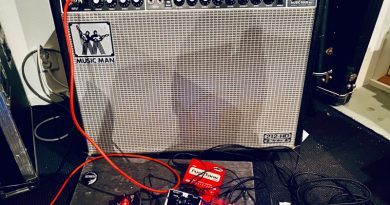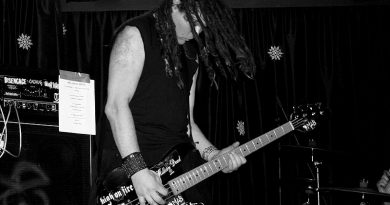Saros Interview
Saros were spawned in 2004 in San Francisco. They might be a new one on some of you but seeing as they have an album pending on Canadas Profound Lore Records they might make their way to your ears. Their blend of thrash and black metal with tinges of doom coupled with spiteful vocals and with occasional soaring clear passages will no doubt whet the appetite of most of the Shaman’s followers. Their critically acclaimed album Five Pointed Tongue gets regular spins from me and gets better with every listen as it is very layered and you notice new things with every listen. A total grower. I caught up with Saros recently and they all contributed, giving their unique take on things.
Before we begin, can you please give us some kind of introduction to Saros, who is who and who does what?
Leila: Saros is and has always been Ben Aguilar on guitar, Tim Scammell on bass guitar, Leila Abdul-Rauf on guitar and vocals, and Blood Eagle on drums.
Blood Eagle: Ben and Leila write the riffs that become the songs. Ben writes the rippin’ leads, Leila’s are more contemplative and melodic. This creates a very interesting balance and contrast in Saros. We don’t have two guitarists trying to out-do the other for sheer wankery – there’s more collaboration and variance. Like more of a story being told – or something like that…
What has been your greatest achievement to date?
Tim: I think our biggest achievement has been staying together through 2 albums. There are very different personalities within the band and it has been interesting to see how we’ve learned how to work together over the years.
Blood Eagle: Finding someone to buy off our clunker ’73 Dodge Tradesman that kept breaking down on us. That, and staying together as a band.
Ben: Acrid Plains and the whole recording experience behind it.
Leila: All of the above, for sure.
What does the name Saros mean, both literally and what does it mean to you personally?
Leila: The term “Saros” has been used throughout history by astronomers to measure eclipse cycles. It was first used by ancient Babylonian astronomers to measure various units of time. Cyclic concepts (e.g. seasonal, historical, mood cycles), are common themes within the lyrics.
Tim: Literal definition aside, I think Saros is a pretty open ended project that allows each of us to reach different types of satisfaction through a unified vision.
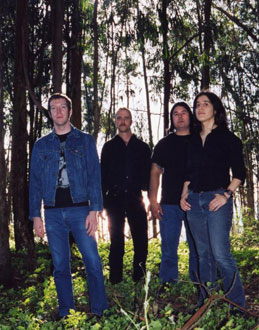
Who has had the most influence on Saros as a band and yourself as an individual? Musical and non-musical?
Ben: As far as music goes, everything from underground metal to radio pop. More important to musical inspiration is everyday life experience. Things like where you live, how you live, who you love, what you love, and anything else that affects your perception of life. I find these things to influence my creative process more than any one band or type of music.
Tim: As far as bassists go, my main influence is Jack Bruce. I just love his style and how he can be very musical while also maintaining a heavy and interesting rhythm. I also have a lot of more general influences such as Big Black, Hawkwind, Voivod, Black Sabbath and The Soft Machines. I tend to listen to a lot of music.
Non-musically, I have to credit my parents for getting me into music initially and the friends and bandmates who have turned me onto different things throughout the years.
Blood Eagle: As for drummers: Elvin Jones, Buddy Rich, John Bonham, Dave Lombardo. These are the drummers I study the most. As far as metal bands, there’s Dissection, Coroner, Carcass, Death and then all the obvious classics – these are the bands I think of most as having influenced the over all sound of Saros. More tangential influences would be bands like Joy Division, early PiL, Bauhaus or My Bloody Valentine. We’re four very different individuals and so bring a wide variety of influences to the table. Ben played in a pop punk band before us.
Leila: I also used to play in a punk band from Ohio called Memento Mori, although the metal influence within this band was apparent. Influences for Saros songwriting draw from various black metal, 70s rock, late 80s progressive metal groups (such as the ones Blood Eagle mentioned above), death rock, and neo-folk; for melodic vocals, I personally worship ethereal female vocalists such as Elizabeth Frasier (Cocteau Twins), Emma Anderson (Lush), Belinda Butcher (My Bloody Valentine), and classics such as Annie Wilson and Astrud Gilberto. Non-musically and lyrically, I am inspired by anything that is potentially transformational to the human psyche, be it loss, grief, death, fear, oppression, tension between individuals causing any kind spiritual or emotional upheaval.
With the Five Pointed Tongue full length now 2 years old, how has Saros evolved during that time? What can we expect from the forthcoming album on Profound Lore Records “Acrid Plains”?
Ben: Since 5PT, writing music together has become easier. We all have matured as a band and as individuals. I think that helps when it comes to challenging ourselves as musicians.
Blood Eagle: We’ve gotten a lot better. We sound more organic.
Tim: I think we understand ourselves and the band more than when Five Pointed Tongue was written. We’ve been able to communicate on a broader musical level than before.
Leila: The songwriting certainly has matured. With Acrid Plains, one can expect a better recording, a greater variety of instrumentation (e.g. guest strings by Kris Force of Amber Asylum), broader influences, and an album that flows better throughout.
Who is doing the artwork? Do you feel that artwork is almost as important as the music?
Leila: Joe Camacho is a local artist/graphic designer who created one of our t-shirt designs and will be designing the artwork and layout for Acrid Plains. The artwork is nearing completion, and I feel that it accurately reflects the listening experience. I feel that artwork and package design has never been more important in a world that is not buying nearly as much tangible product as it used to.
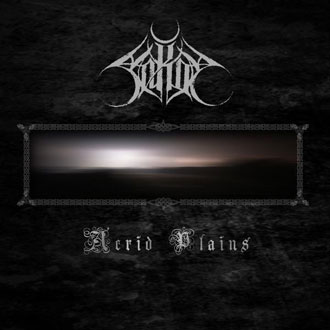
What was it like working with Billy Anderson? Hypothetically speaking, who would you most like to work with?
Tim: I really enjoyed working with Billy. It is great to work with someone who has such a vast amount of experience who is also very down-to-earth and professional.
Ben: Billy was great to work with. I would love to work with him again.
Leila: We had a very positive experience working with Billy; he was incredibly insightful, hardworking, yet flexible, and helped us to capture the overall vision for the album. He is also a very pleasant person to be around which makes it easy when you have to be around someone for many hours at a time. We are open to working with others, but would definitely be open to working with Billy again.
How did the deal with Profound Lore occur? Were they able to offer you something that Hungry Eye could not?
Leila: Profound Lore released Amber Asylum’s Still Point album in 2007 (before I joined), and Kris Force had spoken so highly of her experience with this label that I decided to contact Chris Bruni (Profound Lore) to see if he would be interested in releasing Acrid Plains. I think the fact that Kris made a guest appearance on the album, as well as it being produced by Billy Anderson, initially piqued Bruni’s interest, but in the end, I think the deal was offered as a result of the strength of the album as a whole.
As for our deal with Profound Lore vs. Hungry Eye, the band was in a very different place when we were recording Five Pointed Tongue, which was supposed to be a second demo following our self-released demo in 2004. It was recorded digitally in a tiny rehearsal space, as opposed to Acrid Plains, which was recorded on both 2″ tape and ProTools at a real recording studio. Dan and Asim of HE were old friends of Tim, our bassist. Our deal with HE was essentially a one-off and at that point, we just wanted to get our stuff out there. There were no expectations on either end to keep working with them following FPT. We are very grateful that HE helped us the in way they have. Overall though, our sound is probably more compatible with Profound Lore’s roster of artists than HE’s, and we also appreciate the “artist first” mentality of PL.
Can we talk a little about other stuff you have going on? Amber Asylum and The Bastard Noise are quite a contrast in styles between the three bands. Do you have to adapt much? Or do you have various things that you need to get out of your system?
Leila: The latter, for sure, is the sole reason that I am involved with multiple projects. I think I would get bored very quickly if I played only one genre of music. It is true though that my level of involvement between the three bands is not equal, due to logistics and time constraints, Saros being my first priority in which I take on the most leadership out of the three bands. But I equally value all three and try to contribute as much to all as time will allow me. The extreme contrast between the three bands does require me to be in three different head spaces, since they are each challenging in different ways, but that makes it exciting.
What is it like working with a name like Kris Force? Do you ever feel intimidated? Or do you “step up”? What does your role in Amber Asylum involve?
Leila: It’s been an absolute honor working with Kris these past few years, and we have grown to become close friends through playing together, so no, I wouldn’t say I feel intimidated; she is family to me. I feel I have grown tremendously through working with her; she has a lot to offer as a musician, engineer, producer and sound designer. As you may know, Amber Asylum has had an ever-changing line-up since the beginning. I walked into it knowing that, and value the fluidity and versatility of its identity. Instrument-wise, I have a very multi-purpose role (any combination of guitars, keyboard, voice, effects, etc.), and at the moment, Kris and I are the only core songwriting members, playing with others as they are available.
What about other members? Do they have anything or is their prime focus Saros?
Blood Eagle: The most notorious album I’m on is Dead as Dreams by US progressive Black Metal band Weakling (released by Tumult in 1999). In the last couple years I was working with a power metal band Embers of Euphoria, who recorded a disc I’m quite proud of too. You can track the album down with a simple myspace or google search. Tim & I are currently forming a new group that’s slower, more improvisational and rock driven, but still very heavy.
Recently I performed with a group doing traditional Turkish music on percussion – the Kervan Ensemble. A lot of Turkish and Middle Eastern music is modal and improvisational, kind of like jazz. That’s what draws me to it. I hope to do more of this in the future.
Ben: I own a pool and spa repair business in San Jose, CA. I would love to do another music project, but right now I only have time for 1 band.
Tim: Sam and I are working on a side project that has been a long time coming for me. I have always wanted to do something that incorporates more of my blues/psych/space rock leanings and we have been playing with some guys who are into that as well. It is nice to have an outlet for the Pentagram, ZZ Top, Mahavishnu Orchestra riffs that have been bouncing around in my head and also allows me to focus the more technical metal material for Saros.
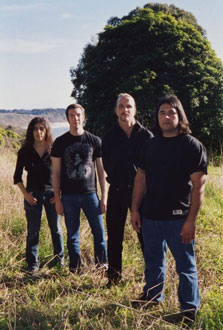
What about Saros’ equipment? What do you all use? Would you accept endorsements? If so, who would you like to get in touch?
Ben: I play a Fender Strat through a Marshall JCM 2000 and 2 Marshall Cabs. I also use a Boss Chorus pedal for some clean parts and a Fulltone OCD pedal for my leads. I would love to purchase an older Rivera Knucklehead or m100.
Tim: I have a pretty straight-forward bass set-up. It is basically an early-80s Ibanez P-bass knock-off played through Ampeg 8×10 cab. I recently added a Mountainking Behemoth pre-amp pedal that has really warmed up my tone. If Fender or Ampeg have an extra equipment lying around, I wouldn’t mind the endorsement.
Blood Eagle: With whatever drum set up I have I rely upon natural volume – not the triggered, processed sound so common today. I prefer deeper kicks (ideally 24″ x 18″) and always use two kicks, not a crappy double pedal (if I can avoid it). They’ve never worked for me. I use a variety of Vic Firth “corpsmaster” sticks. That’s “corpsmaster” as in “marching band,” not “corpse-master” as in Cannibal. My rock star fantasy is to be endorsed by DW drums and have ’em build a mammoth kit to my exact specifications. But currently I work in an office for a day job and so just dream about that kind of thing.
Leila: I play a Gibson SG Special through a Peavey 5150 head and like Ben, two Marshall cabs. I use a MXR Super Comp pedal to boost my solos for live performances, as well as Boss digital delay and chorus pedals. Recently I have been using a vocal processor (mostly reverb and compression) for my live vocals. I have a soft spot for LesPauls so that would be a bit of a dream endorsement.
How is the bay area scene? Is it receptive to Saros, a band which to me is quite tricky to categorize. Perfect band for a mixed bill, however you must have played some shows that weren’t for you?
Tim: The Bay Area scene is very diverse, which has been a big benefit for Saros. I think we’ve fit on even the most diverse bills we’ve been on, but there have been a few that were a bit of a stretch.
Ben: I believe we have been accepted by the local metal scene. Our tunes incorporate many different styles of music that we meld into metal songs. We are not “true” to any one style. The great thing about the SF Bay Area metal scene is that there is not one particular brand of metal that dominates. There is room for bands to be creative and original. It’s more about the art.
Blood Eagle: There’s lots of bands doing stuff that really interests to me, not all of it metal – Grayceon, Passive Aggressive, Ludicra, Mammatus, Earthless, Six Organs of Admittance, Secret Chiefs to name a few. I like bands that sound like themselves rather than projects groomed to some trendy niche or ironic statement.
Leila: Another thing about bay area bands is that there are a lot of bands here that are difficult to categorize, so this makes for a very unique music scene. I think this has worked in our favor, and so most people have reacted positively to how our sound has changed over the past few years, and how it will continue to change. The saturation of talent here also makes for a very critical audience, so it keeps on our toes. Nonetheless, I agree with Ben that we have been embraced more often than not, and in the end, we are our worst critics.
How old were you when you started playing? How often do you practice, the band itself and you personally?
Ben: I started playing guitar in the 5th grade. I don’t have a set practice schedule. Sometimes I’ll play everyday. Sometimes I won’t pick my guitar up for a month.
Blood Eagle: Got my first kit when I was 8.
Tim: I started playing guitar at 14 and bought my first bass at 16. While I played in some other bands throughout the years, I didn’t start taking bass seriously until my early 20s. With 2 projects, I practice at the studio 4 nights per week. I tend to not play at home much these days due to my schedule.
Leila: I started playing around with piano at age 6, just by ear, then studied flute and trumpet from ages 7 to 17. I studied trumpet under a highly skilled jazz player, then when I got sick of having lessons, I decided I wanted to teach myself guitar at age 13. My teen years were spent playing guitar in punk rock bands though simultaneously I studied music theory and composition both in high school and as part of a Music minor in college. These studies were abruptly ended by going to graduate school for speech-language pathology in my mid-twenties. Fast forwarding to the present… Saros usually practices twice a week unless we are taking a hiatus. Ben and I will get together by ourselves if we are writing new material. Like Ben, I don’t have a set practice schedule, and any alone time I get to practice guitar depends on how busy I am with other projects.
I guess you have had your fair share of sexist attitudes? How have you dealt with this? Is this sort of caveman attitude in decline as time goes on?
Leila: It depends on who we are talking about, and what you define to be sexist. Of course, I can only speak for myself and not for the band as a whole. According to what I believe to be sexist, no, I don’t believe sexist attitudes to be declining really. To me, the fact that there are more women in metal bands these days doesn’t mean that sexism is on the decline, though to some people it does. Since I am a bit of a lone wolf in the metal scene because of my beliefs (they tend to fall more left than most), I seek out others that feel the same way – not necessarily women – and they are out there. For the most part, I do not socialize within the metal scene, and my closest friends tend not to be involved with metal at all. On a business level, I try to associate with other bands, promoters and labels who respect women and aren’t opposed to them being in a position of power.
What does the future hold for Saros? What would you like to see happen?
Ben: More albums.
Blood Eagle: A world tour.
Leila: “Acrid Plains” is slated for release Feb 17th, 2009, following which will be a cd release show and more touring, hopefully east coast and abroad.
Thanks a lot for taking the time out. Any final words?
Leila: Thanks for the interview, Jas. For those interested, there is a track from the upcoming album posted on the www.profoundlorerecords.com and www.myspace.com/saros. More news to come in the new year…
Interviewed by: Jas Murray

